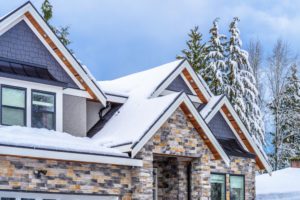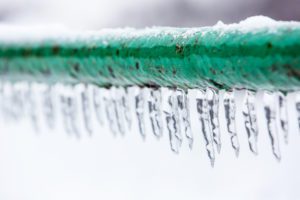Tel: 01992 471001
Severe winter weather looks set to hit the UK earlier than expected this winter, according to weather forecasts, which could catch unsuspecting landlords and their tenants unaware.
The severe weather warning makes right now the best time to check your rental properties roof is intact and leak free and ensure that all property boundary fences are secure.
Heavy rain, snow, sub-zero temperatures and strong winds will eventually cause damage to the roof of any property, but in the private rental sector, the onus to conduct property repairs is definitely on the landlord and not the tenant.

Private rental sector (PRS) landlords should be aware of the benefits of conducting regular routine maintenance on their property assets to help them ensure that all of their rental properties are warm, dry and inviting to potential tenants who may want to live there.
Listed below are a few routine maintenance suggestions that can help landlords avoid getting the winter blues, reduce the potential of paying expensive repair bills and avoid making claims on their Landlords Buildings insurance policies. Taking positive action on rental property maintenance now can even help landlords to attract new tenants looking for a decent, warm and dry rental property during the coldest winter months.
Simple routine maintenance can help landlords prevent costly repairs caused by severe weather and help to keep happy tenants in rental properties for longer periods.
If any repair or maintenance issue is identified on a rental property then action should be taken immediately in order to avoid making a claim on Landlord’s Buildings Insurance policy.
Landlords should ensure that a trusted gas safe registered engineer has visited all of their rental properties to service boilers and all gas appliances before the cold weather really hits the UK, which is expected towards the end of October, according to some forecasters.
Regular servicing helps to prevent boilers from breaking down when they are most needed and makes sure that the gas supply, boiler and any gas appliances are safe for tenants to use and are running at efficient levels. Regular servicing should help to identify any potential or minor faults which could lead to serious problems later on, which could result in the landlord being forced to claim on their specialist insurance.
If UK private rental sector landlords have rental properties that are currently empty, it will prove wise to leave the heating on a low setting to prevent water pipes from being frozen.
Keeping the heating on a low setting when the property is empty may seem like a waste of money, but it can help to avoid costly damage caused by frozen pipes and potential tenants are more likely to opt for warm and inviting rental properties over properties that are cold and damp.
If there are issues with a rental property roof, it is highly likely that the property will be susceptible to cold and damp, lowering the energy performance of the property which will then become too expensive for tenants to keep warm, forcing them to seek alternative rental accommodation. It is also possible that the roof could even become structurally unsound if urgent repairs are ignored.
Landlords should stand over the road from the rental property and survey the roof tiles / slates and check that fascias and soffits are in good condition, taking photographs that can be examined in greater detail when viewed at maximum magnification.
If there are any issues, such as missing or broken tiles, the landlord should get their builder or roofing contractor to conduct repairs immediately.
Damp is probably the single biggest problem faced by landlords during the cold winter months, and even routine maintenance cannot prevent this from happening in rented properties.
It is essential to ensure that the guttering of rental property is clean and free draining throughout the winter to prevent the ingress of water into the property.

Water pipes need to be lagged sufficiently to prevent them from freezing up and bursting in all UK properties over the winter.
Leaking taps need to be fixed, outside taps need to be wrapped up against the cold and hosepipes should be disconnected and stored for future use in order to prevent damage to property and tenants should be instructed to keep central heating on low during the coldest weather.
Tenants should have been made aware of where the stop tap is located when they first moved in to the rental property. This is vital so that the tenant can isolate the water supply to prevent further damage to the property, should the worst happen.
All un-insulated properties lose heat in cold weather, regardless of whether they are newly built or period properties. Walls can be externally insulated or fitted with cavity wall insulation and loft spaces should have a minimum of at least 270mm of insulation material
Tenants can often confuse damp with condensation caused by their own lifestyles, yet it is landlords who are expected to deal with the issue, however, prevention is better than a cure.
All properties need to breathe and air needs to circulate, air vents allow this to happen, many tenants mistakenly block ventilation holes due to draughts, however they will be complaining about damp within a short timescale because of this.
Tenants should be instructed not to block up air vents, no matter how cold it gets, and tenants should be encouraged not to use radiators to dry clothes on and ensure that tumble dryers are vented outside the property rather than allowing moist air to remain inside the rental property.
Draught proofing is a really simple job that landlords can do for tenants, using foam or rubber sealant strips around doors and windows can help stop the cold penetrating the rental property, draught excluders at the base of external doors and draught excluding brushes can be fitted to the inside of letterboxes will also help keep the heat in.
Taking action on the issues briefly outlined above may not be enough to prevent extreme weather causing damage to rented properties, so landlords need to ensure that they have the correct type of Landlords Buildings Insurance in place that will cover the cost of rental property damage.
Why do I need a valuation?
The best way to protect your jewellery in the event of loss or damage is to insure …
15 Jul 2024
As we are fast approaching the holiday season we thought it a good idea to give you some hints and tips to …
19 Jun 2024
It’s worth checking the small print to ensure a suitable replacement vehicle is provided in the event of an accident, says Ashbourne …
21 May 2024